When it comes to indulging our feline companions, it’s essential to know what’s safe and what’s not. A common query among cat owners is whether it is safe for cats to consume salmon skin. Salmon is renowned for its abundant omega-3 content and other nutrient benefits. However, is it safe for our beloved furry companions to consume the skin of this fish? In this article, we’ll delve into the specifics, considering nutritional benefits, potential hazards, and overall best practices when it comes to offering your cat this particular seafood treat.
Is Salmon Skin Healthy For Cats?
In moderation, salmon skin can provide health benefits to cats because of its rich omega-3 fatty acid content. These essential nutrients promote optimal skin, coat, and overall feline well-being. These essential fats have anti-inflammatory properties that can help alleviate symptoms in cats with allergies or arthritis. In addition, salmon skin is rich in taurine, a vital amino acid for cats that promotes heart and eye health. However, while the nutritional benefits are clear, there are several considerations to keep in mind. The skin must be thoroughly cooked to kill any parasites, and it should be served plain, without any seasonings, oils, or sauces that could potentially be harmful to cats. It is important to mention that, similar to any treat, salmon skin should not exceed 10% of your cat’s daily caloric intake. This precaution is necessary to prevent obesity and other health concerns.
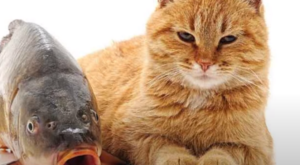
Can Cats Have Raw Salmon Skin?
It is not advisable to feed cats raw salmon skin. Raw salmon, including the skin, can contain parasites that could harm your cat. Known as salmon poisoning disease, this condition can be fatal if not treated promptly. Furthermore, uncooked salmon skin can pose a choking risk, especially when it is not sliced into small, easily manageable pieces for your feline companion. Therefore, it’s always best to thoroughly cook any salmon, including the skin, before giving it to your cat. Remember, moderation is key. Though salmon skin has health benefits, it should only be given occasionally, not as a significant part of your cat’s diet.
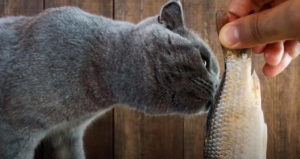
Things To Be Aware Of When Feeding Cats Salmon And Skin
When it comes to feeding your cat salmon and its skin, it’s important to consider several factors to ensure the safety and well-being of your feline friend. Firstly, be wary of any potential allergenic reactions.
Taking these considerations into account will help you create a safe and enjoyable experience for both you and your cat when treating them with salmon skin.
What Happens If Cats Eat Salmon Skin
Generally, if cats eat properly prepared salmon skin (thoroughly cooked, no seasonings, oils, or sauces), they may experience health benefits like improved coat condition and reduced inflammation due to omega-3 fatty acids. Excessive consumption, on the other hand, may result in weight gain and other health complications due to the high caloric value. Raw, seasoned, or bone-in salmon skin can pose risks like parasitic infections, choking hazards, and digestive problems. Therefore, it is always important to prepare salmon skin correctly and serve it in moderation. If your cat exhibits any signs of discomfort, illness, or allergic reaction after consuming salmon skin, it is imperative to promptly reach out to your veterinarian for immediate assistance.
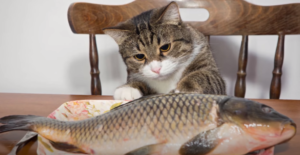
The Benefits Of Salmon For Cats
Salmon provides cats with a multitude of health benefits. As a rich source of high-quality protein, it plays a vital role in promoting the growth and repair of body tissues, while also bolstering a robust immune system. Salmon, rich in omega-3 fatty acids, promotes heart health and enhances joint mobility. This is particularly advantageous for older cats afflicted with arthritis, providing them with much-needed support. The taurine it contains is vital for your cat’s heart, digestive system, and eyes. Moreover, the vitamin D in salmon supports bone health, while the natural oils can enhance the shine and condition of your cat’s coat. Like salmon skin, it’s important to serve cooked, deboned, and unseasoned salmon to your furry friends. However, it’s best to offer it as an occasional treat rather than a regular part of their diet. This helps prevent health issues such as obesity and vitamin A toxicity.
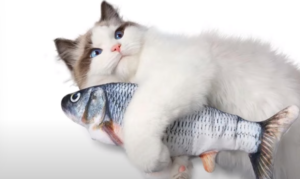
Are There Any Disadvantages Of Salmon?
While salmon has health benefits for cats, there can be drawbacks if not served properly or if it’s a significant part of their diet. Overfeeding your cat with salmon can result in weight gain as it is high in fat content. Additionally, while salmon is rich in vitamin D, too much can lead to vitamin D toxicity, which can cause bone deformities, muscle atrophy, and even kidney failure. Overfeeding salmon to your cat can cause an imbalance in its diet, potentially leading to a deficiency in essential nutrients if salmon is the sole source of food. Lastly, some salmon may contain heavy metals like mercury, which could be harmful if ingested in large quantities. Therefore, while salmon can be a beneficial addition to your cat’s diet, it’s crucial to balance it with other food sources and serve it in moderation.

Can I Give My Cat Cooked Salmon
Yes, you can certainly give your cat cooked salmon. Cooked salmon is a nutritious treat for cats, packed with protein, omega-3 fatty acids, and taurine. Ensure salmon is cooked thoroughly to eliminate parasites. Serve plain, without harmful seasonings, oils, or sauces for your cat. Remove bones before serving to prevent choking or internal injury. Please keep in mind that while salmon can be a delicious and beneficial indulgence for your feline companion, it should not constitute the majority of their dietary intake. It is always advisable to seek guidance from your veterinarian to guarantee a well-balanced diet, promoting optimal health and well-being for your beloved feline companion.
Can Cats Eat Smoked Salmon
Cats should avoid consuming smoked salmon. Although smoked salmon may be tempting, it is important to note that it is generally high in salt, which can have adverse effects on cats’ health. Consuming an excessive amount of salt can result in salt poisoning, manifesting symptoms like vomiting, diarrhea, decreased appetite, lethargy, and in severe cases, seizures. Smoked salmon may contain spices and additives that could potentially be harmful to your cat. Additionally, the smoking process does not completely eradicate the potential for parasites in the fish, which can lead to health problems in cats. For this reason, it is advisable to serve your cat plain, fully cooked salmon without any additional seasonings when offering this fish as a treat. It is important to always serve food to your cat in moderation, ensuring that all bones are removed. If you have any questions or concerns about your cat’s diet, it is recommended to consult your veterinarian.
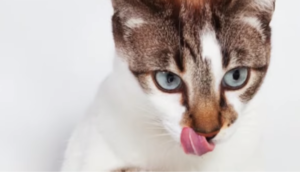
FAQ
Can pets eat salmon skin?
Yes, pets can eat salmon skin, but it should be prepared and served in moderation. Salmon skin is rich in omega-3 fatty acids, benefiting your pet’s coat and skin health. However, there are some precautions to consider. First, thoroughly cook the skin to eliminate potential parasites. Secondly, serve it plain, without any seasonings, oils, or sauces. Finally, it is important to remove any small bones to ensure the prevention of choking hazards. It’s important to watch for allergic reactions in your pet, especially if they’ve never had salmon before. If you experience any adverse effects like itching, swelling, or difficulty breathing, contact your vet right away. Remember, while salmon skin can be a healthy treat, it should not replace your pet’s regular balanced diet.
Can cats eat salmon skin and bones?
It is not recommended for cats to consume salmon skin and bones unless they have been appropriately prepared. Feeding cats cooked and unseasoned salmon skin is generally safe. Feeding salmon bones to them, however, presents a substantial risk. Small and sharp, salmon bones can cause choking and potentially damage your cat’s throat or intestines. Hence, it is of utmost importance to consistently remove any bones before feeding salmon to your feline companion. Please keep in mind that any type of salmon, including the skin, should only be given as an occasional treat and not as a regular part of your cat’s diet. It is always advisable to seek guidance from your veterinarian if you have any queries regarding the inclusion of salmon or any other human food in your cat’s diet.
Can cats eat salmon from the store?
Yes, cats can eat store-bought salmon, but there are a few things to consider. Firstly, the salmon must be fully cooked and boneless. Raw fish may have parasites harmful to cats, and bones can cause choking or internal damage. Secondly, canned salmon or pre-packaged salmon meals often contain additives, preservatives, and seasonings, including sodium, that are unhealthy for cats. So, it’s better to avoid them. If you do buy salmon from the store, make sure it is fresh and plain, devoid of any seasonings or sauces. Lastly, it’s important to remember that salmon, although a good protein and omega-3 fatty acid source, should only be given as an occasional treat, not a regular part of your cat’s diet. Before making any changes to your pet’s diet, consult your vet for the best advice.
Can cats eat skins?
Yes, in general, cats can eat the skin of certain types of fish and poultry, provided it has been thoroughly cooked and is free of any seasonings, oils, or sauces. The skin of salmon, for instance, can provide beneficial omega-3 fatty acids. Remember, excess skin can contribute to fat accumulation and potential weight gain, posing health risks for your cat. As well, some skins can be tough to digest. Always ensure that the skin is properly prepared, free from bones or other hazards, and served in moderation. Before making any alterations to your pet’s diet, it is advisable to seek guidance from your veterinarian.
Can cats and dogs eat fish skin?
Yes, both cats and dogs can eat fish skin, but it needs to be prepared appropriately. Fish skin is an excellent source of Omega-3 fatty acids, crucial for maintaining skin, coat, and immune system health. Nevertheless, it is crucial to ensure that the skin is cooked thoroughly to completely eradicate any potential parasites. Always serve it plain without any seasoning or sauce, which could be detrimental to your pet’s health. Also, ensure there are no bones in the skin to prevent choking. Despite the benefits, fish skin should be given sparingly as an occasional treat, not a regular part of their diet, due to its high fat content. Additionally, it is important to be aware that certain pets may have allergies to fish. Therefore, closely observe for any indications of an allergic reaction and, if observed, promptly seek veterinary assistance. Always consult your vet before introducing new foods to your pet’s diet.
Can dogs eat raw salmon skin?
Dogs shouldn’t consume raw salmon skin. Feeding dogs raw fish, including salmon skin, can expose them to parasites and bacteria that can be harmful to their health. Thoroughly cooking the salmon skin can effectively eliminate these potential hazards, ensuring a safer and more enjoyable dining experience. Moreover, any seasonings or sauces that may accompany the skin of raw salmon could potentially harm your dog’s well-being. If you decide to feed your dog salmon skin, ensure it is well-cooked, bone-free, and served plain. Similar to cats, dogs should only have salmon skin as an occasional treat, not a regular part of their diet. If your dog has never eaten salmon skin before, monitor them closely for any signs of an allergic reaction, including itching, swelling, or difficulty breathing.
Can humans eat raw salmon?
Certainly! While humans can consume raw salmon, it is crucial to ensure proper preparation to minimize the potential for foodborne illnesses. Salmon is served raw in dishes like sushi and sashimi, but it is usually flash-frozen before preparation to eliminate parasites. Remember, eating raw or undercooked seafood can put you at risk of getting parasites or bacteria like Salmonella or Vibrio. Pregnant women, young children, the elderly, and those with compromised immune systems should avoid raw or undercooked seafood to reduce the risk of infection. For the utmost safety and enjoyment, it is highly recommended to indulge in raw salmon, as well as any other raw seafood, exclusively from trustworthy sources and skillfully prepared by experienced culinary experts. Always check the regulations and recommendations from public health authorities and consult a healthcare professional if in doubt.
Is salmon good for pets?
Yes, salmon can be a beneficial addition to your pet’s diet when given appropriately. It’s a protein-rich source with essential omega-3 fatty acids that promote heart health, improve skin and coat, and support the immune system. However, it’s important to cook salmon thoroughly to eliminate parasites and serve it plain, without seasonings, sauces, or bones that could be harmful to your pet. Furthermore, while salmon can provide beneficial nutrients, it should not replace a balanced, species-appropriate diet for your pet. Feeding salmon to your pets should be limited to occasional treats rather than making it a regular part of their diet. Before making any dietary changes for your pet, consult with a veterinarian first. If you’re unsure about feeding salmon or any other human food to your cat, seek advice from a professional.
Why can’t cats eat salmon?
While cats can eat salmon, it is important to note that they should consume it in moderation and under specific conditions. Overconsumption of salmon, like any other fish, can cause a thiamine (vitamin B1) deficiency in cats. This deficiency can cause health issues such as loss of appetite, seizures, and in severe cases, death. Moreover, cats can ingest harmful parasites from raw or undercooked salmon. Additionally, commercially purchased salmon frequently contains excessive sodium levels and other additives that are detrimental to the health of cats. Due to its high-fat content, an excessive amount of salmon can potentially lead to obesity and other health issues in cats. Hence, although salmon can be a nourishing delicacy rich in protein and omega-3 fatty acids, it is advisable to offer it sparingly, ensuring it is thoroughly cooked and free of bones. Consult your vet before making any changes to your cat’s diet.
Is salmon too rich for cats?
Salmon can indeed be too rich for cats if consumed in excess. High fat content, while beneficial in moderation for Omega-3 fatty acids, can cause stomach upset or more serious conditions like pancreatitis if cats consume excessive amounts. In particular, salmon skin, being particularly high in fats, should be given in moderation. Furthermore, it is crucial to verify that the salmon, like any human food, does not contain any ingredients that can be harmful to cats, such as onions, garlic, or specific herbs and spices. Additionally, processed or smoked salmon products may contain excessive salt, which is not ideal for cats. Hence, although salmon can serve as a valuable protein and fatty acid source, it is advisable to include it in moderation as a component of a well-rounded dietary plan. It is always advisable to seek guidance from your veterinarian before introducing any new foods into your cat’s diet.
Can cats eat salmon skin reddit?
On Reddit, opinions vary on whether cats can eat salmon skin. Some users report no issues feeding their cats small amounts of cooked and thoroughly deboned salmon skin, praising it for the Omega-3 fatty acid benefits. Some individuals raise concerns about the significant fat content and the potential for parasites. They advise against feeding salmon skin to cats, suggesting it is preferable to avoid it altogether. It is also advised to introduce new food gradually, allowing for careful observation of any potential allergic reactions or digestive problems that may arise. On Reddit, the consensus aligns with professional advice: consult your veterinarian before introducing new foods to your pet’s diet. Every cat is different, and only a veterinarian who knows your cat’s health history can provide accurate individual advice.
Can cats have honey?
While honey is not toxic to cats, it’s not necessarily beneficial for them either. Cats are obligate carnivores, adapted for a meat-rich diet. They lack the necessary enzymes to digest plant-based foods, like honey, effectively. Consuming too much honey could potentially lead to digestive upset, including diarrhea and vomiting. Furthermore, honey’s high sugar content can lead to obesity and dental issues in cats. Therefore, it is generally not recommended to give honey to cats. Before introducing new foods to your cat’s diet, it is always advisable to seek guidance from a veterinarian. In conclusion, when it comes to the question of whether cats can eat salmon skin, the answer is that while it can be given as an occasional treat, it should not be included as a staple in their diet. As with any dietary changes for your pet, consult with a veterinarian first and always monitor for any signs of an allergic reaction or digestive issues.
Useful Video: Can Cats Eat Raw Salmon ?
Conclusion
To summarize, salmon, including its skin, can serve as an occasional delicacy for cats. This is because it boasts a high protein content and beneficial omega-3 fatty acids. It is crucial to prioritize the thorough cooking and careful deboning of the salmon, as well as serving it without any potentially harmful seasonings. Despite its nutritional benefits, overconsumption can lead to health issues such as thiamine deficiency, stomach upset, and obesity. Therefore, moderation is key. In a similar vein, although honey is not inherently toxic to cats, it is generally advised against due to their carnivorous nature and limited ability to digest plant-based foods. Always consult with a veterinarian when considering any changes to your cat’s diet. Keep in mind that what may be effective for one pet might not be appropriate for another, as individual dietary requirements can differ.
References:
- https://catcarechecklist.com/cat-care/cat-questions/can-cats-eat-salmon-skin/
- https://cooperpetcare.com/can-cats-eat-salmon-skin/
- https://upgradeyourcat.com/can-cats-eat-salmon-skin/
- https://faqcats.com/can-cats-eat-salmon-skin/
- https://petkeen.com/can-cats-eat-salmon/

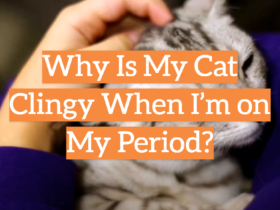



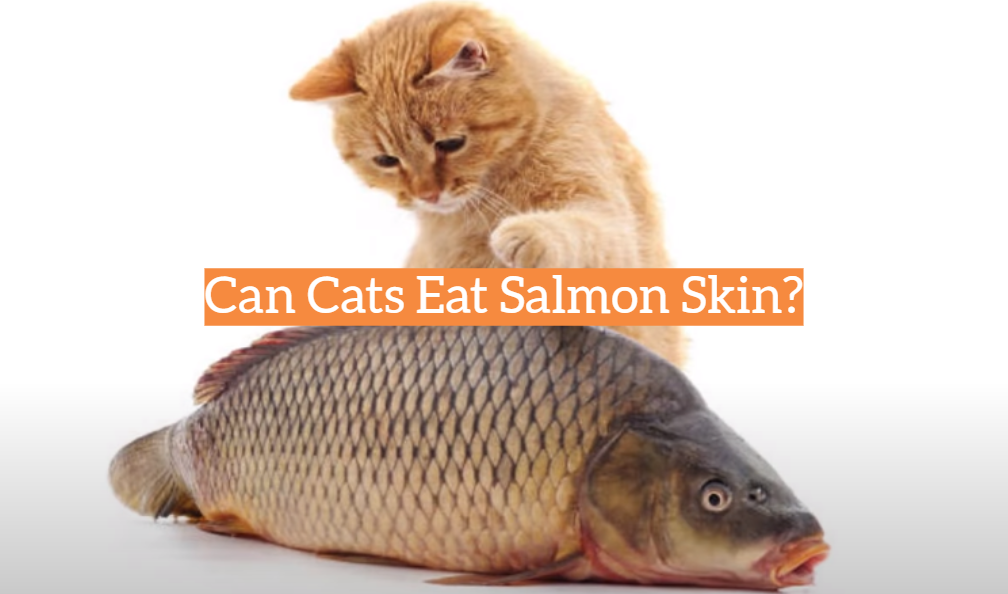




Leave a Reply